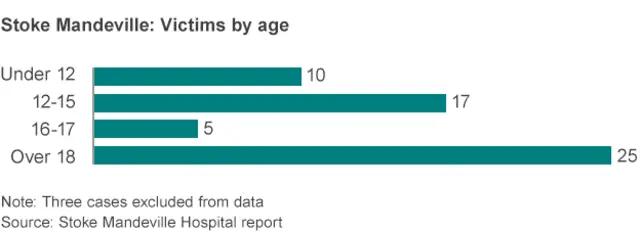Postpublished at 10:45 GMT 26 February 2015
The breakdown of Jimmy Savile's victims at Stoke Mandeville shows the vast majority were adults:

Late DJ and TV presenter Jimmy Savile abused 63 people at Stoke Mandeville Hospital, a report finds on 26 February
Nine informal complaints of sexual behaviour not taken seriously - one formal complaint should have been reported to police
Savile's abuse at Stoke Mandeville was an "open secret" as early as 1973 and he was regarded as a "sex pest"
A separate report finds "elements of the Savile story" could happen again
Vanessa Barford, Alex Therrien, Paul Gribben and Rob Corp
The breakdown of Jimmy Savile's victims at Stoke Mandeville shows the vast majority were adults:

Her report says: "We believe that there should be DBS (disclosure and barring service) checks on NHS hospital staff and volunteers every three years."
Jane Dreaper
Health correspondent, BBC News
tweets, external: Lampard: regulations need to be changed to ensure all volunteers and staff at NHS hosps have barring list checks
It says: "While it might be tempting to dismiss the Savile case as wholly exceptional, a unique result of the perfect storm of circumstances, the evidence we have gathered indicates that there are many elements of the Savile story that could be repeated in future.
"There is always a risk of the abuse, including sexual abuse, of people in hospitals.
"There will always be people who seek to gain undue influence and power within public institutions including in hospitals."
Here's the report, external by former barrister and NHS executive Kate Lampard.
While the independent report into Jimmy Savile's abuse in hospitals focuses on Stoke Mandeville Hospital, other NHS trusts have released reports on his connection with them, including Springfield University Hospital in south-west London.
Seven allegations of sexual assault were made against Jimmy Savile's brother, Johhny Savile, who worked as a recreation officer at Springfield in the late 1970s up to 1980. He was dismissed from employment in 1980 as a result of an allegation made by one of his victims.
There was no evidence or record of his brother Jimmy Savile ever visiting Springfield Hospital.
She says everybody needs to rearrange volunteer arrangements processes.
Ms Lampard says when she challenged organisations about why they didn't have policies for dealing with celebrities and important people visiting, she says the invariable answer was "we don't get visits from celebrities" - and what strikes her is that those are exactly the type of hospitals that might mismanage those visits.
Kate Lampard says much of the story of Savile and his associations with NHS hospitals is unusual to the point of being scarcely credible. "It concerns a famous, flamboyantly eccentric, narcissistic and manipulative television personality using his celebrity profile and his much-publicised volunteering and fundraising roles to gain access, influence and power in certain hospitals." But she says features of the story have everyday implications and relevance for the NHS today.
She says safeguarding in hospitals rests above all on training and retraining staff on how to create a safe environment, and challenging inappropriate behaviour.
Kate Lampard says the investigations suggest most hospitals do not have adequate, explicit or robust policy for dealing with celebrities. One of the report's recommendations is for all NHS hospitals to have a robust policy for agreeing to and managing visits from celebrities and important people.
She says there are common themes and issues that have emerged from the separate NHS investigations into Savile, which are relevant for the wider NHS today:
The freedom Savile had to roam around NHS hospitals, the lack of supervision of him as a volunteer, the failure of NHS hospitals to identify and manage the risks Savile presented and to keep patients, visitors and staff safe from his abuses, the fact that serious concerns about Savile were not raised or if they were they were not taken seriously, the inappropriate control Savile had over charitable funds and the influence that control gave him and finally the part that politicians and senior civil servants played in promoting Savile.
Kate Lampard says everyone has the right to feel safe in hospital.
That report "indicates the need for us to examine safeguarding arrangements in NHS hospitals, the raising of complaints and matters of concern, and how managers and staff respond to complaints".
Former barrister and NHS executive Kate Lampard, who was appointed by Health Secretary Jeremy Hunt to oversee an investigation into how Savile could have abused victims at about 40 NHS hospitals across the country, is now speaking at the press conference.
Dr Johnstone says those who complained about Savile were failed. "The one formal complaint was dropped by the complainant's father due to her serious ill health. The individuals to whom these incidents were reported failed in their duty to protect," she says.
Dr Androulla Johnstone says when Savile was appointed by Margaret Thatcher's government to oversee fundraising and the rebuilding of the new National Spinal Injuries Centre at Stoke Mandeville hospital, he was given too much power. She said the management structure at the centre was inadequate at the time:
"Adherence to policy frameworks was poor, leadership was weak, and supervision and monitoring processes in relation to Savile were absent. In 1980, when Savile was appointed by senior politicians and department officials, regulatory checks and balances were not put into place. Statutory functions were placed in the hands of a celebrity fundraiser, and this meant that department and NHS officials lost control of the Spinal Injuries Centre project. This was remiss."
 Hugh Pym
Hugh Pym
Health editor
tweets, external: Stoke Mandeville report author Androulla Johnstone says Govt in 1980 were remiss in giving top level endorsement of Savile
The Stoke Mandeville report also found that "over the past four decades Stoke Mandeville has employed three doctors who have subsequently been convicted of sex crimes against patients".
Dr Johnstone says most of the victims didn't really say what happened to them when they reported abuse in the 1970s. They'd say something like "I don't like Savile", she says.